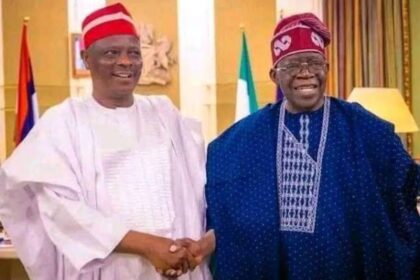● Truth over Turmoil: Presidency Defends Oil Czar in Wake of Coercion Allegations
● Cutthroat Currents: Lessons to Learn as Ojulari Steers NNPCL Through Rumour, Rivalry, and Reform
Rumours often grow legs faster than the truth can lace its shoes. Over the weekend, one such rumour, dressed in the garb of certainty, claimed that Bayo Ojulari, the Group Chief Executive Officer of the Nigerian National Petroleum Company Limited (NNPCL), had been thrust in detention and coerced into signing his resignation. It was a story that, if true, would have sent tremors through the engine room of Africa’s largest economy.
But the Presidency, through the Special Adviser to President Bola Ahmed Tinubu on Information and Strategy, Bayo Onanuga, has swiftly swatted the tale aside, declaring it “false and unfounded.”
Ojulari, handpicked by President Tinubu in April 2025, remains at the helm of the nation’s oil behemoth, steering through the choppy waters of reform, expectation, and history’s long shadow.
From here, the story unfolds, not merely as the quelling of a single falsehood, but as the prologue to a much larger drama: the battle to reclaim the NNPCL from the ghosts of its past and the vindictive pull of a disgruntled cabal.
No sooner than the rumours broke out than it pervaded the alleys of Nigeria’s political discourse over the weekend; the narrative of a sudden and dramatic fall from grace for Ojulari shook the oil industry and corridors of power. The tale was embroidered with the names of the powerful: Ola Olukoyede, Chairman of the Economic and Financial Crimes Commission, and Adeola Ajayi, Director-General of the Department of State Service, cast in the role of enforcers. It was a story calculated to jolt the nation’s energy heartbeat.
The Presidency, however, would have none of it. Through the unequivocal voice of Onanuga, the narrative was cast down as “false and unfounded.” Ojulari, appointed by President Tinubu barely four months ago in April 2025, remained firmly in his seat, charting a course through the oil giant’s labyrinthine challenges. The rebuttal was not merely an act of damage control; it was an assertion that the nation’s oil helm had not been wrenched from its captain at the very moment he was needed most.
Yet, the incident illuminated something far more profound; how fragile public trust remains in the management of Nigeria’s oil fortunes, and how closely the fate of the NNPCL is watched, speculated upon, and sometimes weaponised.
For decades, the corporation has been less an engine of shared prosperity than a paradox, a citadel of immense potential, yet a recurring symbol of waste, opacity, and scandal. It has swayed between promises of reform and the gravitational pull of entrenched decay. In the collective memory, its history is littered with the debris of subsidy controversies, crude oil theft, and policy summers that never turned to harvest.
It is into this troubled sector that Bayo Ojulari stepped as a custodian of daily operations and an alchemist burdened with the task of turning the lead of inefficiency into the gold of national renaissance. His mandate thus depends on a vehicle of transparency, energy transition, local content development, subsidy-era aftercare, environmental justice, and the reclamation of Nigeria’s oil pride in global forums.
No GCEO inherits the NNPCL in innocence. The institution is a sprawling labyrinth whose very corridors are built from decades of secrecy. For the Nigerian people, the corporation is a mystery wrapped in bureaucracy, where numbers rarely meet daylight and policies are often shaped behind veils. The burden Ojulari carries is therefore not solely managerial, it is existential. His appointment was no idle bureaucratic exercise; it was the granting of a rare opportunity to recast the oil company as a model of accountability and innovation.
More than an errant spark…
The false tale of Ojulari’s supposed detention and coerced resignation is more than an errant spark from the rumour mill; it is a parable of the volatile terrain he now walks. In the oil industry’s theatre, rumours are never idle, they are often weapons, unsheathed by unseen hands to destabilise, intimidate, or undermine. That such a narrative could take root so quickly speaks to the fevered atmosphere in which the NNPCL exists, an atmosphere thick with intrigue and sharpened by the collision of vested interests.
In the high-stakes economy of crude, power is currency and perception is a form of control. Leaders in this space are rarely assailed with open combat; the more lethal blows are dealt in the shadows, through leaks, insinuations, and planted half-truths. Ojulari’s emergence as GCEO was never going to be a ceremonial coronation, it was an invitation into a chess game where every move is watched, countered, and sometimes sabotaged. This latest rumour, though false, is a reminder that even his seat at the helm is not immune to the currents of disruption.




